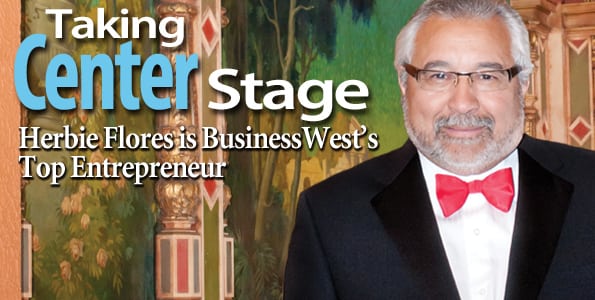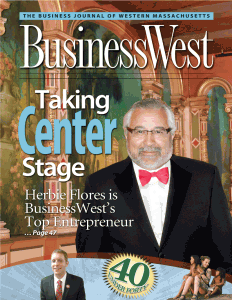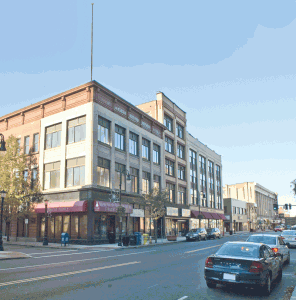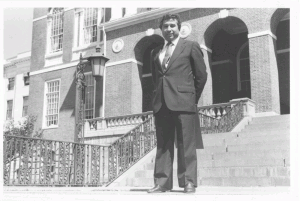
Taking Center Stage
Herbie Flores Is Making His Vision for Springfield Reality
 Heriberto “Herbie” Flores has always had a heart for needy people, partly because he grew up poor. From its humble origins 40 years ago providing legal and financial assistance for migrant farm workers, he has grown his multi-agency nonprofit, Partners for Community, into an $80 million force for economic development and community improvement. But he’s made bigger news with a series of real-estate acquisitions, including the Paramount Theater (seen here), that promise to transform Springfield’s downtown. The kind of long-term change Flores envisions for the City of Homes will require energy and passion — and BusinessWest’s Top Entrepreneur for 2011 has no shortage of either.
Heriberto “Herbie” Flores has always had a heart for needy people, partly because he grew up poor. From its humble origins 40 years ago providing legal and financial assistance for migrant farm workers, he has grown his multi-agency nonprofit, Partners for Community, into an $80 million force for economic development and community improvement. But he’s made bigger news with a series of real-estate acquisitions, including the Paramount Theater (seen here), that promise to transform Springfield’s downtown. The kind of long-term change Flores envisions for the City of Homes will require energy and passion — and BusinessWest’s Top Entrepreneur for 2011 has no shortage of either.
“This city is coming back,” Heriberto Flores said. “People don’t want to live out in the woods.”
He was sharing a vision of a societal shift away from suburban sprawl back to a city-life model, especially as aging Baby Boomers increasingly seek to live close to all the amenities they need and desire, from food stores and restaurants to banks and performing arts.
As Flores spoke those words, he was standing beside the stage of the 86-year-old Paramount Theater on Main Street in Springfield, an icon of music and theater that has fallen into disrepair — but whose walls, ceilings, and fixtures are breathtaking in their ornate beauty, for anyone willing to look beyond the dust, grime, and faded paint.
And vision is something Herbie Flores has in spades.
Just as he sees the potential in the Paramount — a $1.75 million purchase that will require millions more to restore to a multicultural center for performing arts and community events — he’s also an unabashed optimist when it comes to Springfield itself, choosing to focus on the positives of the city and not the large pockets of poverty, high-school dropout rates, crime, and other issues that often color people’s perceptions.
“When you start looking at the assets, the city has clean water and natural resources. We have companies like Big Y, Peter Pan, and MassMutual. We have three TV stations in this city. We have Baystate Medical Center — how many people would kill to have a hospital like that in their region? And all the schools and universities … this is a very good region,” he told BusinessWest.
“I could live anywhere, but I live in Springfield,” Flores continued. “The investments we make in the city, some people say, ‘they’re paying too much for that.’ ‘Why are they doing that?’ But you have to invest for the future. I don’t believe Springfield will be in the position it is today in the future. I see the changes coming.”
For the past three decades, from his stewardship of a social-assistance network called Partners for Community to his more recent ambition to transform the city’s downtown, Herbie Flores has been the catalyst for many of those changes, and for those reasons, among others, he is BusinessWest’s Top Entrepreneur for 2011.
“Purchases like the Paramount and the Bowles building [further south on Main Street] involve risk, and they require vision,” O’Brien continued. “Together with other things happening downtown to bring vibrancy and a larger, more diverse residential population in that area, these bold steps could provide the much-needed spark that Springfield needs.”
Said Flores, “the city needs help, the city and the region; we have a responsibility to step up to the plate. There are problems, but you can’t just stand in the corner and complain. And nobody’s going to do it for you.”
That optimism doesn’t go unnoticed by those in Flores’ circle.
“I think very highly of Herbie,” said Russ Omer, vice president of Commercial Lending for Chicopee Savings Bank, the lead lender on the Paramount project. “He’s been involved in the neighborhood for 30 years, and I’ve always known Herbie to be community-minded. Whatever he did, he always did it for the betterment of his community. The Paramount is just one example of what he does for Greater Springfield.”
For this issue, Flores speaks about some of those initiatives, and discusses how he is creating a legacy that promises to keep improving Springfield long after he’s gone.
Street-level Perspective

Herbie Flores says the acquisition of the Bowles Building could be a spark for downtown revitalization.
The $11 million project, completed in July 2011, combined federal tax credits, private-investment tax credits, Mass. Department of Housing and Community Development funds, city of Springfield HOME funds, and private financing — a good example of the tapestry of players Flores must weave together to turn one of his visions into reality.
And although it’s just one parcel amid one of the poorest neighborhoods in Massachusetts, when one stands under the rebuilt wood porches and clean, quiet doorways away from the street, it doesn’t feel like a low-income neighborhood.
“America was not built by rich people,” Flores said. “It was built by poor people who did something to create wealth.”
Flores knows something about starting poor. Born in Caguas, Puerto Rico, he was intimately acquainted with poverty as his family struggled for sustenance throughout his childhood. It was there, he said, that he began to identify himself with economically deprived groups and devote himself to service on their behalf.
He moved to Springfield with his family in 1965, then served with the Army in Vietnam in the late ’60s. He has remained active in veterans’ causes, and was named Springfield Veteran of the Year in 2001.
But it was his affinity with migrant farm workers that led to the development of an agency — the New England Farm Workers’ Council — to help them out with various needs, from fuel assistance to job skills to education. That agency would, in the decades that followed, morph into Partners for Community, an $80 million nonprofit with several departments under its umbrella.
Those include the Corporation for Public Management, which seeks solutions to welfare dependency, chronic joblessness, and illiteracy, and also focuses on providing services to those with physical and developmental disabilities; the Corporation for Justice Management, a leader in community-based offender re-entry services to reduce recidivism and address public safety; and New England Partners in Faith, which supports small, faith-based organizations.
Solid Ground
Those agencies share space with a number of private businesses in a number of buildings owned by the Farm Workers’ Council downtown, including 11-13 Hampden St., 1628 Main St., and 1666 Main St., among others.
About 25 years ago, Flores made his first forays into real estate through Brightwood Development Corp. (BDC), a nonprofit formed with the goal of providing housing and economic development on the north side of Springfield. As president and CEO of the BDC, he developed a $2.5 million shopping center, La Plaza del Mercado, on Main Street in 1995, followed by a $3 million neighborhood medical clinic, El Centro de Salud Medico Inc., the next year. That was immediately followed by a $2 million rehabilitation of blighted, multi-family houses in the North End.
His recent deals are helping him secure a wide swath of downtown, which will have a dual effect. First, the resulting critical mass of space will ultimately create economies of scale for development opportunities, as well as a diverse mix of inventory that will suit the needs of a wide range of potential tenants. Second, it will allow him to control the immediate environs around his buildings, reducing opportunities for negative elements to creep in.
The Massasoit building, which houses the Paramount, will be renovated as phase one of Flores’ planned downtown redevelopment. The theater will boast a completely new façade, with interior renovation of the seats and stage area, including all technical aspects of a performing-arts theater. Work on the four-story building, which will include other commercial and residential space, is expected to begin during the first quarter of 2012.
As Flores led BusinessWest through the cavernous corridors — including a projection room hollowed out of equipment and rows of narrow, beaten-up, red seats in need of restoration or replacement — he talked about the impossibility of pleasing everyone with a project of this scale, but with a clear belief that the end result will be worth all the give and take.
“You can work to do something for yourself,” he said from the theater floor, just in front of the stage, “or you can work to do something for society.” Clearly, he envisions a restored, vibrant Paramount as an example of the latter.
Then there’s the Bowles building, a property recently purchased for $2 million which currently houses the Student Prince restaurant; that structure will be phase two of the council’s planned downtown development. The office building will be renovated for commercial and residential space, with work beginning sometime in 2013. However, the adjacent parking lot, which will be converted to a four-story, covered parking garage, will be part of phase one and will be completed first.
Flores said the Bowles project could became a key initiative in efforts to prompt more people with disposable income to make downtown Springfield their mailing address, a necessary ingredient in any municipal recovery effort.
Flores has been a participant in two so-called ‘City2City’ excursions that have taken delegations from the Springfield area to resurgent cities — Greensboro and Winston-Salem, N.C. in 2010, and Grand Rapids, Mich. late last year — and said that, in both instances, investments in the downtown areas, and especially those in market-rate housing and entertainment-related ventures, provided sparks that translated into real momentum.
He says he wants to do the same in Springfield.
Glass Half-full
Flores said he enjoys the politics and networking necessary to bring together the necessary investors, both public and private, to create real-estate deals. And he enjoys the challenge of doing so at a time when many people still don’t believe in Springfield’s potential.
“Sometimes people tell you it’s a bad time to invest in Springfield,” he said. “But if you take that attitude, nothing gets done. You have to be able to see the opportunities and run with them.”
Simply put, it doesn’t matter whether people see the city’s glass as half-empty of half-full. “The way I see it, even if the glass is empty, then there are more opportunities.”
The number of projects occurring downtown, he added, will make the landscape more attractive to other investors, although many of the city’s problems — keeping kids in school, creating more jobs, etc. — will take more than time and money to solve, and he also believes Springfield desperately needs an infusion of young, middle-class residents. Still, he said, banks are willing to back realistic capital projects today, even though lending regulations are more difficult to navigate.
Omer called Flores an example of someone creating projects that the entire community can benefit from — the Paramount being a good example.
“He wants to make it available to faith-based organizations, Springfield public schools, and other community events, as well as some general entertainment,” he said, adding that the mere idea of restoring that building appeals to many longtime city dwellers.
“I tell the story that I grew up in Springfield, and I used to go to the movies there. They’d pass out free pencil boxes in the ’50s and ’60s. Today, it could be a museum in itself. I think it’s a great thing to preserve in Springfield, and now the city is going to get to enjoy it.”
Flores says he doesn’t envision the Paramount as a standalone attraction, but something that should operate alongside other entertainment venues and restaurants as part of a destination district for fine arts.
“The symphony should be doing a show, the Basketball Hall of Fame should be doing some kind of activity, the MassMutual Center should be doing some hockey, CityStage should be doing something, and the Paramount should be doing something,” he said. “If we think with a big vision, advertising will come in, and everyone can make money.”
Omer said Flores approaches projects with the big picture in mind, “kind of like a chess player, always four or five moves ahead of the pack. He’s a very bright, astute businessman, and over the years he’s been very successful at completing his projects.”
Something to Build On
In addition to his other endeavors, Flores is president of the North End Educational Development Fund, which administers the largest Hispanic scholarship fund in New England, providing college scholarships for underprivileged, inner-city Springfield residents — and, hopefully, starts them on their own journeys of success.
“I’d like to see another 25 millionaires come out of Springfield,” he told BusinessWest. “If people can make money here, they will invest and stay. I see myself as a catalyst to open doors.”
As he walked around the Bowles building and toward his modest office overlooking Hampden Street, Flores said people have wondered what wealth he could have amassed as a for-profit real-estate entity. But he said he’s building more than just physical structures. He’s also constructing a legacy — through his nonprofit endeavors guided by a committed board — that will far outlast his own life and continue to remake Springfield for decades to come.
“I’m not making anything for myself,” he said. “I’m building all this wealth for the nonprofit, so that, when I’m gone, we’ll be able to do some good in the future. Money is neutral — money is not good or bad. Good people with money can do good things, and bad people with money can do a lot of bad things.
“I have tried to set up these programs and buildings to have something for the next generation,” he continued. “I don’t know who’s going to be here 25 years from now, but these programs and services will still be here.”
Flores said he believes people should take responsibility for their community with the resources they have, and he’s tried to run his business — and prioritize his life — that way.
“I’m hard on myself. I keep saying there’s more that can be done,” he said. “I ask, ‘did you leave it better than found it? What did you do to make this country better?’ I can honestly say I’m still working on it.”
To Herbie Flores, that goal is paramount — and reachable.
Joseph Bednar can be reached at businesswest.com
Previous Top Entrepreneurs
• 2010: Bob Bolduc, founder and CEO of Pride
• 2009: The Holyoke Gas & Electric Department
• 2008: Arlene Kelly and Kim Sanborn, founders of Human Resource Solutions and Convergent Solutions Inc.
• 2007: John Maybury, president of Maybury Material Handling
• 2006: Rocco, Jim, and Jayson Falcone, principals of Rocky’s Hardware Stores and Falcone Retail Properties
• 2005: James (Jeb) Balise, president of Balise Motor Sales
• 2004: Craig Melin, president and CEO of Cooley Dickinson Hospital in Northampton
• 2003: Tony Dolphin, president of Springboard Technologies in Springfield
• 2002: Timm Tobin, then-president of Tobin Systems Inc.
• 2001: Dan Kelley, then-president of Equal Access Partners
• 2000: Jim Ross, Doug Brown, and Richard DiGeronimo, then-principals of Concourse Communications
• 1999: Andrew Scibelli, then-president of Springfield Technical Community College
• 1998: Eric Suher, president of E.S. Sports in Holyoke
• 1997: Peter Rosskothen and Larry Perreault, co-owners of the Log Cabin Banquet and Meeting House
• 1996: David Epstein, president and co-founder of JavaNet and the JavaNet Café in Northampton






